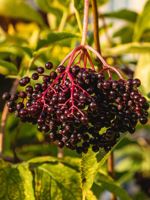Mon-Fri 9am - 5pm Mountain time
Budds Yellow Dogwood (Buds Yellow Dogwood) vs Bob Gordon Elderberry
Sambucus canadensis Bob Gordon
Cornus sericea Budds Yellow
NOT AVAILABLE THIS SEASON - MIGHT RETURN
Bob Gordon Elderberry is a Black Elderberry cultivar that produces berries that are larger and sweeter than other varieties, making it one of the top cultivars. It produces large clusters of white flowers that turn into large clusters of dark purple to black berries. The berries are well-suited for baked goods, jams, jellies, and syrups. It was selected from the wild in Missouri.
The large berry clusters that the Bob Gordon Elderberry produces will often end up hanging downward. This makes it more difficult for birds to feed on the berries. If birds are a concern, this might be the right berry for you.
Black Elderberries are considered to be partially self-pollinating. So while they will still produce some berries without cross-pollination, planting with another variety will increase yields. Consider planting with Black Elderberry or Ranch Elderberry.
Warning: the seeds, stems, leaves, roots, and uncooked berries are toxic to humans when eaten in quantity. Berries should be cooked to make them safe for human consumption.
Budd's Yellow Dogwood is a select cultivar of Yellow Twig Dogwood that reaches 5 ft tall and wide. It is adaptable and disease resistant which allows it to survive in difficult areas. The striking yellow twigs will add winter interest to your landscape and contrast nicely with Red Osier Dogwood. You can also try contrasting Budd's Yellow Dogwood with more textured trees such as evergreens.
Bob Gordon Elderberry Quick Facts
Budds Yellow Dogwood (Buds Yellow Dogwood) Quick Facts
Toxicity: leaves, stems, and uncooked berries are poisonous to humans

